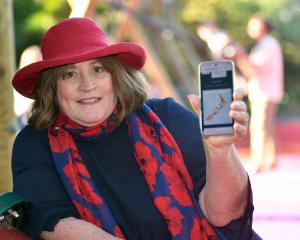Brother and sister Lloyd and Lexie came from the organisation's breeding centre in Auckland and will spend the next year being socialised and trained by puppy walkers and their families.
Lexie will be the seventh puppy Lorraine Knowles and her family has worked with in the past 10 years.
She started volunteering because her children had always wanted a puppy but it was hard to travel with a normal dog, whereas a guide dog in training can be taken anywhere - even to work.
Lexie will spend five mornings a week at St Francis Xavier School where Mrs Knowles works in the office.
It was hard to say goodbye to the puppies after about 12 months with them, but she knew the work they were doing was valuable, she said.
"I like to think we are doing something good at the end of the day."
Lloyd will join Richard Hodson and his family, becoming the eighth puppy they have trained since 2000.
Mr Hodson found it "really rewarding when you see you puppy working".
"We are really lucky to do something that is so much fun but worthwhile at the same time," he said.
South Island region guide dog mobility instructor Mike Prisk said the walkers and puppies played an important role in raising the profile of the RNZFB.
"What we've tried to do is provide opportunities for puppy walkers out in the regions, which helps with public education."
Puppy walkers put a "significant amount of effort" into training puppies by socialising them with people and introducing them to everyday situations they will encounter as guide dogs such as escalators, shopping malls, supermarkets and restaurants.
At least two Otago people are waiting to be paired with a guide dog, but Lexie and Lloyd could be placed anywhere in New Zealand, depending on people's needs.
By the numbers
2 - The number of years it takes to train a guide dog.
$22,500 - How much it costs to breed, raise, train and match a dog.
240 - The number of guide dog teams in New Zealand, made up of one dog and one blind, deaf and blind, or partially sighted person.
40 - The number of people waiting for a guide dog.
6-12 - months The average time a person in need waits for a guide dog.
8-10 - years The average working life of a guide dog.
$0 - The amount of government funding the Guide Dog Services receive.
Puppy journey
- Dogs are carefully selected and bred at the RNZFB's Guide Dog Services.
- When about 8 weeks old, puppies are placed with puppy walkers who socialise them and introduce them to everyday situations.
- After about 12 months the puppies are assessed for their personality, temperament, manners, and reactions to differing situations.
- After passing their assessments, the puppies spend six months training intensively to be a guide dog.
- They are then matched to a blind, deaf and blind, or partially sighted person, then after bonding, they spend two to five weeks training with a mobility instructor.
Interacting with guide dogs and puppies-in-training
- Do not distract them while they are working.
- You can tell a guide dog is working because it will be wearing a harness, while a puppy-in-training will be wearing a red coat.
- If you want to pat a guide dog or puppy, always ask the blind handler or walker first and only do so with their express permission.
Advertisement













